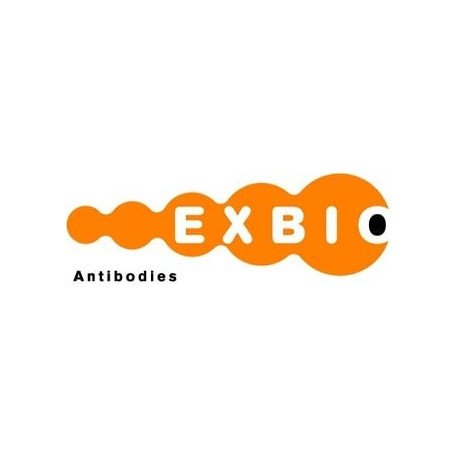Cart 0 Product Products (empty)
No products
To be determined Shipping
0,00 € Total
Prices are tax excluded
Product successfully added to your shopping cart
Quantity
Total
There are 0 items in your cart. There is 1 item in your cart.
Total products (tax excl.)
Total shipping (tax excl.) To be determined
Total (tax excl.)
Data sheet of Mouse Monoclonal to Hsp90 alpha,beta
| Brand | Exbio |
| Product type | Primary antibodies |
| Reactivity | Human, Mouse, Bovine, Other not determined |
| Clonality | Monoclonal |
More info about Mouse Monoclonal to Hsp90 alpha,beta
| Brand: | Exbio |
| Product no.: | 11-533-C025 |
| Product type: | Primary antibodies |
| Host species: | Mouse |
| Product name: | Mouse Monoclonal to Hsp90 alpha,beta |
| Antigen: | Hsp90 alpha,beta |
| Clonality: | Monoclonal |
| Clone: | MBH90AB |
| Isotype: | IgG1 |
| Immunogen: | Peptide corresponding to the sequence EEVHHGEEEVEC within N-terminal part of human Hsp90. |
| Format: | purified |
| Specificity: | The antibody MBH90AB recognizes the epitope EEEVE within N-terminal part of ubiquitously expressed Hsp90 alpha and Hsp90 beta proteins with calculated Mw of 84.7 kDa and 83.3 kDa, respectively, however, migrating as 90 kDa bands under reducing SDS-PAGE conditions._x000D_ |
| Categories: | Transcription Regulation & Nuclear Proteins (Veterinary), Transcription Regulation & Nuclear Proteins (Rodent), Transcription Regulation & Nuclear Proteins (Human) |
| Concentration: | 1 mg/ml |
| Storage buffer: | The reagent is provided in stabilizing phosphate buffered saline (PBS) solution containing 15mM sodium azide. |
| Storage / stability: | Store at 2-8°C. Do not freeze. Do not use after expiration date stamped on vial label. |
| Background: | Hsp90 (heat shock protein 90) is one of the most abundant chaperones in the cytosol of eukaryotic cells. It interacts with various proteins, including protein kinases and transcription factors, and either facilitates their stabilization and activation or directs them for proteasomal degradation. Hsp90 thus affects multiple signaling pathways and biological processes and modulation of this single target offers the prospect of simultaneous intervence to various key points of oncogenic transformation. Hsp90 operates as a dimer in a conformational cycle driven by ATP binding and hydrolysis. There are two isoforms, alpha and beta, of vertebrate Hsp90. Whereas Hsp90 beta is expressed constitutively to a high level, Hsp90 alpha is stress-inducible and is overexpressed in many cancerous cells._x000D_ |
| Purity: | > 95% (by SDS-PAGE) |
| Purification: | Purified by protein-A affinity chromatography |
| General references: | *Millson SH, Truman AW, Rácz A, Hu B, Panaretou B, Nuttall J, Mollapour M, Söti C, Piper PW: Expressed as the sole Hsp90 of yeast, the alpha and beta isoforms of human Hsp90 differ with regard to their capacities for activation of certain client proteins, whereas only Hsp90beta generates sensitivity to the Hsp90 inhibitor radicicol. FEBS J. 2007 Sep;274(17):4453-63._x000D_ , *Pearl LH, Prodromou C, Workman P: The Hsp90 molecular chaperone: an open and shut case for treatment. Biochem J. 2008 Mar 15;410(3):439-53._x000D_ , *Hooven TA, Yamamoto Y, Jeffery WR: Blind cavefish and heat shock protein chaperones: a novel role for hsp90alpha in lens apoptosis. Int J Dev Biol. 2004;48(8-9):731-8._x000D_ , *Scheibel T, Buchner J: The Hsp90 complex--a super-chaperone machine as a novel drug target. Biochem Pharmacol. 1998 Sep 15;56(6):675-82._x000D_ , *Pratt WB: The hsp90-based chaperone system: involvement in signal transduction from a variety of hormone and growth factor receptors. Proc Soc Exp Biol Med. 1998 Apr;217(4):420-34._x000D_ |
| Related products: | - Mouse Monoclonal to HSV2 (glycoprotein G) - Mouse Monoclonal to Hsp90 beta - Mouse Monoclonal to HSV1 (glycoprotein C) |
| Shipping condition: | Room temperature |


